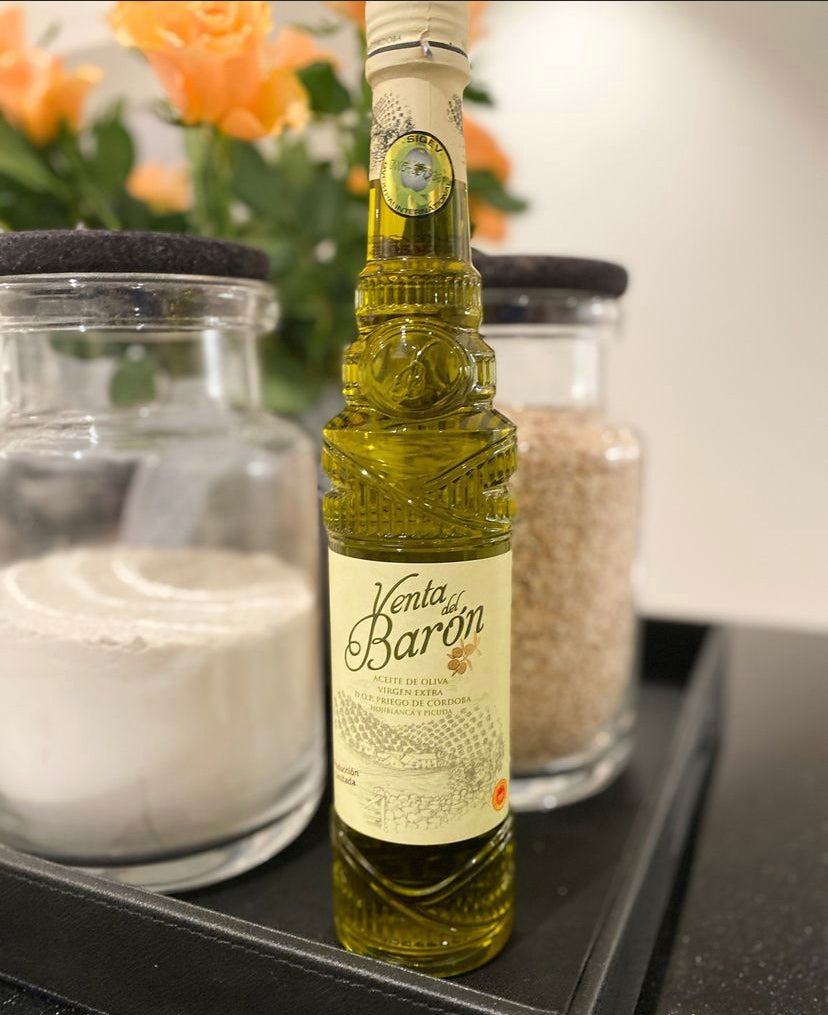
We all know that the use of olive oil, also known as "liquid gold," is indispensable in our daily lives. Whether in Mediterranean cuisine, consumed raw, in salads, preserves, and marinades, or used in cooking, stewing, and frying - olive oil is the key element of our diet. As explained in other blog posts, olive oil has numerous uses in our daily lives, including in cosmetics, hair care, making hummus, and even in the medical field, such as for the health development of dogs. Given that olive oil is a staple of our lifestyle, it's important to have adequate information to determine the quality of olive oil. Just because an olive oil carries the label "extra virgin" doesn't necessarily mean it's good or high quality. We'll show you how olive oils from Venta del Barón ensure maximum quality and give you valuable tips on how to distinguish authentic, high-quality olive oil from a subpar product.
Olive Oils that "Appear" Good
It may surprise you to learn that many olive oil brands employ deceptive practices to make their products appear of higher quality than they actually are.
1. Color
The belief that greener olive oil is better is a widespread misconception. While it's a legitimate practice to achieve a vibrant green color by using very green olives and natural pigments from olive leaves, professional tasters often use blue tasting glasses to exclude color influences in their evaluations.
2. Packaging
The packaging of olive oil plays a crucial role in the perceived quality of the product. Some olive oils invest heavily in the aesthetics of the packaging, but lack quality inside, potentially leading the consumer to believe they are purchasing an attractive and high-quality product.
3. Cold Behavior
Contrary to the myth that high-quality extra virgin olive oil solidifies in the refrigerator and forms butter-like lumps, this is not a valid criterion. Solidification depends on the content of free fatty acids and triglycerides. You can experiment by storing various oils, both refined and extra virgin olive oils, in the refrigerator to observe the results.
Recognizing Olive Oil Quality: 5 Expert Tips
Now that you know how inferior oils can masquerade as high quality, here are some tips for assessing the quality of extra virgin olive oil (EVOO):
1. Labeling
Ensure that the label of the olive oil contains the term "Extra Virgin Olive Oil" and indicates that the first extraction was performed under cold conditions. It's common to confuse extraction with cold pressing, but the former should be avoided on the label.
2. Taste
When tasting a spoonful of olive oil, extra virgin olive oil should produce a robust bite and a hint of bitterness. This is caused by polyphenols, natural antioxidants derived from olives. In inferior olive oils, this bite may be absent, indicating a lower polyphenol content.
3. Production Date
The more recent the production date of the olive oil, the younger and higher quality it is. Fresh olive oil retains its nutrients in full and impresses with its fruity, bitter, and pungent flavors.
4. Packaging Quality
Although packaging can deceive, it's true that olive oil is sensitive to light and oxidation. If the oil is bottled in darkened bottles or provided with protective packaging, its quality is better preserved.
5. Aroma
The scent should contain herbal and fruity notes. If the aroma is overly vinegary or too olive-like, it may not be of high quality.
These recommendations can help you find the olive oil with the best quality. However, the only 100% reliable method to determine if the olive oil is truly high quality is through tasting. We invite you to explore the range of extra virgin olive oils from Venta del Barón and learn the story behind our excellent olive oil.
Cost-Effective Extra Virgin Olive Oil
Finding truly high-quality yet relatively affordable extra virgin olive oil can be a challenge. If you're looking for this "liquid gold" at a lower price, you may need to compromise on some quality aspects. However, be cautious with excessively cheap options, as they may be oil blends that compromise purity and quality. High-quality olive oil is an investment in health, so it's not advisable to compromise on this product.
Frequently Asked Questions
How do I recognize a good olive oil?
Recognizing a good olive oil of high quality is often not so easy. Therefore, pay particular attention to the origin designation and quality certifications such as "extra virgin". Additionally, olive oil should be stored in darkened bottles or containers to protect the oil from light and heat. Also, examine the detailed information on the packaging regarding the manufacturing process. Cold-pressed olive oils contain more nutrients and flavors, making them significantly more flavorful than chemically produced olive oils.
What's better, virgin or cold-pressed olive oil?
Virgin olive oil refers to the olive oil production process without the use of chemical solvents. Here, you can distinguish between the quality levels "virgin olive oil" and "extra virgin olive oil". Natural oils are often cold-pressed below 27 degrees Celsius, preserving important ingredients. Therefore, when buying olive oil, pay attention to both designations: extra virgin and cold-pressed olive oil.
What quality levels denote the highest quality olive oil?
The best and highest quality olive oil is typically labeled as "extra virgin olive oil". Additionally, you can pay attention to other factors. Natural olive oils are often cold-pressed, but you should still make sure that this is the case. A low acidity level is also a sign of high-quality olive oil. Quality certificates guaranteeing the origin and quality of the olive oil are additional important quality indicators.
